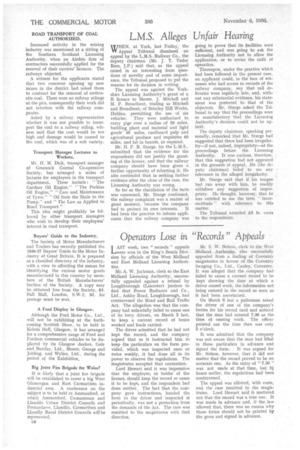Operators Lose in
Page 42

If you've noticed an error in this article please click here to report it so we can fix it.
"Records" Appeals
LAST week, two " records " appeals were won in the King's Bench Division by officials of the West Midland and East Midland Licensing Authorities.
Mr. A. W. Jackman, clerk to the East Midland Licensing Authority, successfully appealed against a refusal by Loughborough (Leicester) justices to find that Power Radiance and Co., Ltd., Ashby Road, Loughborough, had contravened the Road and Rail Traffic Act. The allegation was that the company had unlawfully failed to cause one of its lorry drivers, on March 2 last, to keep a current record of hours worked and loads carried.
The driver admitted that he had not kept the record, and the company argued that as it instructed him to keep the particulars on the form provided, which was inspected once or twice weekly, it had done all in its power to observe the regulations. The magistrates accepted that contention.
Lord Hewart said it was imperative that the employer, as holder of the licence, should keep the record or cause it to be kept, and the respondent had done neither. The fact that the company gave instructions, handed the form to the driver and inspected it periodically, was not a protection from the demands of the Act. The case was remitted to the magistrates with that direction. Mr. S. W. Nelson, clerk to the West Midland Authority, also successfully appealed from a finding of Coventry magistrates in favour of the Coventry Swaging Co., Ltd., Canley, Coventry. It was alleged that the company had failed to cause a current record to be kept showing the time at which a driver ceased work, the information not being entered in the record so soon as it had been ascertained.
On March 6 last a policeman asked the driver of one of the company's lorries for his record card and noticed that the man had entered 7.30 as the time of ceasing work. The officer pointed out the time then was only 5 o'clock.
It was admitted that the company was not aware that the man had filled in those particulars in advance and signed the form. It was argued for Mr. Nelson, however, that it did not matter that the record proved to be an accurate one. As the entry of " 7.30 " was not made at that time, but 21, hours earlier, the regulations had been contravened.
The appeal was allowed, with costs, and the case remitted to the magistrates, Lord Hewart said it mattered not that the record was a true one. It was made in advance and, if the law allowed that, there was no reason Why those forms should not be printed by the gross and signed in advance.












































































































